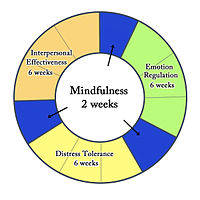
Photo from wikipedia
Participant training alone is typically insufficient to ensure adoption of a new treatment. This study provides preliminary data on a pilot program that implemented written exposure therapy (WET) through a… Click to show full abstract
Participant training alone is typically insufficient to ensure adoption of a new treatment. This study provides preliminary data on a pilot program that implemented written exposure therapy (WET) through a virtual facilitated learning collaborative (VFLC) that combined clinician training with implementation support. Ninety-five mental health clinicians from Veterans Health Administration clinics enrolled in the VFLC. Clinicians received 6 hr of training in WET plus weekly group consultation on training cases for 12-16 weeks. Clinic leaders participated in monthly group calls with facilitators to develop and track implementation plans, address barriers, and share resources. Clinicians completed the Perceived Characteristics of Intervention Scale and Implementation Climate Scale before training and after consultation, and the Intention Scale for providers after the program. Clinicians' positive perceptions of WET increased over time, t(85) = -8.80, p < .001, d = 0.95, and changes were moderated by how much reduction in symptoms their patients experienced, t(151) = -2.13, p = .035. The implementation climate for WET also improved over time, t(85) = -3.55, p < .001, d = 0.36. Consistent with the theory of planned behavior, clinicians' intention to continue using WET after training was influenced by their perceptions and attitudes about WET, subjective norms, and perceived behavioral control. The VFLC model was feasible and associated with increases in clinicians' and leaders' support for using WET. Patient outcomes predicted the amount of change in clinicians' perceptions about WET. (PsycInfo Database Record (c) 2022 APA, all rights reserved).
Journal Title: Psychological services
Year Published: 2022
Link to full text (if available)
Share on Social Media: Sign Up to like & get
recommendations!